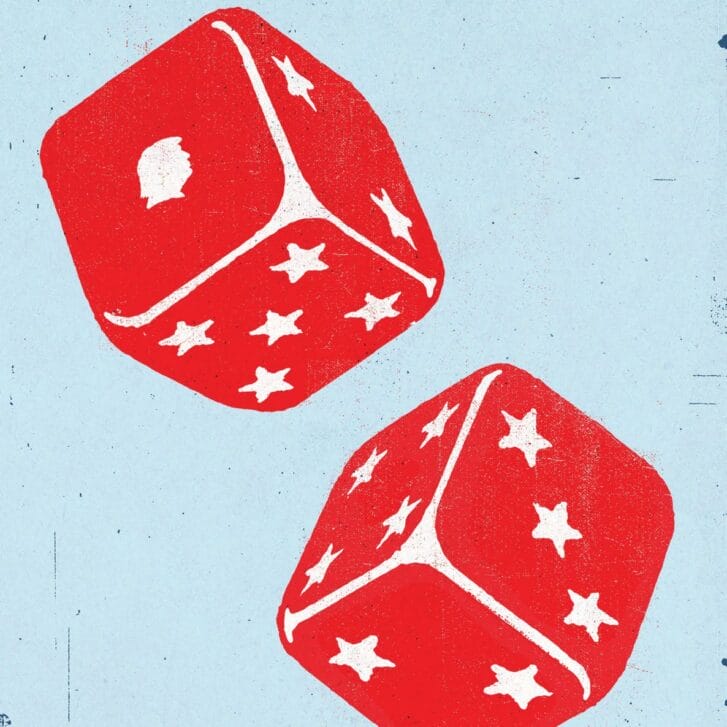DATA INTERPRETED

Portion of India’s 1.2 billion population living below the poverty line
In their research paper “Assessing the Demand for Micropensions Among India’s Poor,” Olivia S. Mitchell, a Wharton professor of business economics and public policy and executive director of the Pension Research Council, and Anita Mukherjee, a professor at the Wisconsin School of Business at the University of Wisconsin-Madison, examined the country’s new pension system, which is aimed at convincing low-income workers to invest in their future. Their research shows that individuals broadly preferred a plan that offers withdrawals starting at age 60 as well as partial withdrawals beforehand.
THOUGHT
How Government Can Boost Innovation
Digital innovation is giving rise to new business models, but regulations don’t always evolve as quickly as technological change—at least, that’s the perception. So what should policymakers and regulators do? Wharton legal studies and business ethics professor Kevin Werbach, who wrote a policy brief about the topic for the Penn Wharton Public Policy Initiative, recently shared his insights into that question with Knowledge@Wharton.
“The Skype and Uber comparison is basically that both of them were companies that when they started were illegal in most jurisdictions. Skype—the very popular internet communications service, originally voice calling, now also video and messaging and so forth, [and] now owned by Microsoft—was illegal in most of the world when it launched, because there were rules saying you could not do a communications service, a telephone service, outside of the existing regulatory infrastructure.
“In the U.S., because of what we did—I was at the Federal Communications Commission in the 1990s, when we had to think about voice over IP [Internet Protocol]—we very deliberately left open the door. Even though things like Skype were outside of the regulatory structure, we made a conscious decision to allow them to develop. And that’s an example of regulators consciously deciding not to impose a whole set of rules early on—when these were nascent technologies—allowing them to grow.
“We saw a lot of examples [of government’s positive impact on innovation] with the growth of the internet and electronic commerce, starting 20 years ago. One of them was the antitrust case against Microsoft. Microsoft was the dominant company in the personal computer [market] and in the operating system market, and lots of startup companies—like Netscape—realized they wanted to innovate, they wanted to build the internet economy as we know it today. You couldn’t have Microsoft standing there, using its power at the time.
“It’s hard to realize today, with what’s happened—the growth of Apple and smartphones and so forth—just how much power Microsoft had. Microsoft controlled access to the PC, and the PC was the only game in town. Had it not been for that action by the government—filing that antitrust case—Microsoft might have been able to warp or slow down the growth of the open internet economy. And it turned out most of the startups were on the side of the government in the case.”
THOUGHT
“ The most successful people in retirement look to use their talents and passions to make a contribution.”
Stewart Friedman, practice professor of management at Wharton and founding director of the Wharton Work/Life Integration Project. Research indicates that those who are happiest in retirement tend to “give back.” While that can mean boosting charitable contributions, for a growing number of retirees it often comes in the form of a significant volunteer position or an encore career.
DATA INTERPRETED

Amount of time following the airing of a TV advertisement in which online searches for the product increase
According to Shawndra Hill, a senior fellow at the Wharton Customer Analytics Initiative who examined the phenomenon of “second screening.” Also of note: The smaller the device, the more likely a viewer will search online directly after seeing a TV ad.
Source: “Television and Digital Advertising: Second Screen Response and Coordination with Sponsored Search,” by Hill, Gordon Burtch from the University of Minnesota, and Michael Barto, a data scientist at Microsoft
DATA INTERPRETED

Total books distributed to children in need by First Book, a hybrid nonprofit that charges a small shipping fee per book to cover the operating cost of its book bank and adopted atypical terms with publishers to buy books at discount. With its “heart in the social sector and head in the private sector,” First Book was described by management professor and vice dean of the Wharton Social Impact Initiative Katherine Klein as “one of the most impressive nonprofit social enterprises I know.”
THOUGHT
 If You’re Happy and You Know It—Don’t Show It?
If You’re Happy and You Know It—Don’t Show It?
The pursuit of happiness is so intrinsic to the American psyche that the phrase was written into the Declaration of Independence. But new research suggests that just like ice cream and chocolate cake, too much happiness can be detrimental to our well-being. Maurice Schweitzer, Wharton professor of operations, information, and decisions, recently spoke on the Knowledge@Wharton show about his research and explained why extremely happy people may want to dial it down.
“We found that when you see somebody who is very happy, you assume that they’re not paying close attention. They’re not going out and finding out negative information around them; they’re not listening to your show; they’re not reading the newspaper. We assume that they’re sheltering themselves from negative information. As a result, we assume that they’re naive and subject to exploitation. Part of the way I think about it is, there are some people who are very upbeat, very happy, who believe that happiness is going to be motivating and inspiring and attractive. Some of that is true, but as leaders, we need to also be quite mindful of the fact that when we exude a great deal of happiness, we may also need to address concerns about how wise we are about the world.”
Published in the Spring/Summer 2017 issue of Wharton Magazine.





















 If You’re Happy and You Know It—Don’t Show It?
If You’re Happy and You Know It—Don’t Show It?




